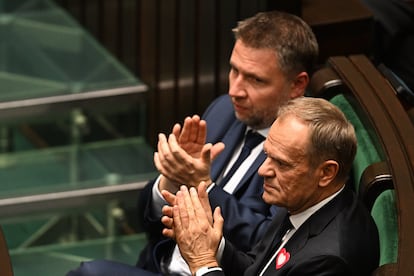Poland begins to bury the era of the ultraconservative Law and Justice government
The liberal parties hold a majority in the newly-elected parliament. Incumbent Prime Minister Mateusz Morawiecki has been given the task of forming a new government, but any attempt at extending his time in power seems doomed


On Monday, November 13, in Warsaw, a few dozen protesters appeared near the Parliament of Poland. This was the day when the newly-elected legislators took office, after winning their seats on October 15. Orderly and under the impassive gaze of the police, the activists began to dismantle the fences that the ultra-conservative Law and Justice party (PiS) had installed back in 2016, to counter protests against its judicial reforms. Later on, the protesters did the same thing near the Constitutional Tribunal.
Szymon Holownia — the new president of the Sejm (or Lower House) — subsequently ordered the permanent removal of the sidewalk barrier. Thus began the legislative session in which the country’s liberal forces are seeking to reestablish the rule of law and democratic values.
A month after the elections, the PiS — the party that was founded by Deputy Prime Minister Jaroslaw Kaczynski — is still “in kind of a state of shock,” according to Artur Wroblewski, a professor of political science, who ran on the PiS list without winning a seat. The party won the plurality of votes (35.4%), but didn’t achieve the necessary support to govern. In the opinion of the political scientist, this is because “[Kaczynski] overheated the campaign and exaggerated his positions.”
“If the party continues as before — very conservative, imposing anti-abortion rules, cooperating closely with the [Catholic] Church, trying to [raise fears about] Muslim immigration, being extremely critical of the EU and obsessed with Germany — it will become extinct,” Wroblewski warns, while smoking hookah in downtown Warsaw.
The eight years of ultra-conservative rule have left a country that’s stuck with the ideas that Wroblewski outlines. The PiS had two essential instruments that allowed it to impose its agenda: the judiciary and the state-owned media. However, last week, the parties led by conservative Donald Tusk — who served as prime minister from 2007 until 2014 — took the first steps towards dismantling the illiberal PiS system, through the strength of their new parliamentary majority.
While President Andrzej Duda has entrusted incumbent Prime Minister Mateusz Morawiecki with the task of forming a new government, this project will likely fail. By December, it’s expected that the new liberal coalition will also control the executive branch.
Last week, when asked what the new Poland will be like, MP Andrzej Domanski — from Tusk’s center-right Civic Platform (PO) party — solemnly replied that “Poland took a 180-degree turn on October 15. We’ve returned to Europe, [after having gone down a path] to become Hungary.” The coalition agreement presented by the three liberal parties is an outline of the country they hope to build: a pro-European, law-abiding Poland, with liberal democratic values and constructive international relations.
Domanski — who is in the running to become the minister of finance — mentions some potential fiscal measures, such as a “substantial” increase in teachers’ salaries, income tax reductions and a commitment to renewable energy. The new administration will also focus on “restoring the rule of law and attracting foreign investment,” he assures EL PAÍS.
The document that includes the basic commitments made by the new government also mentions the construction of “a modern nation,” although it doesn’t mention legalizing abortion, protecting the rights of the LGBTQ community (such as the ability to marry or adopt) or safeguarding refugees. “In our coalition, there are conservative forces,” the legislator acknowledges, referring to the Third Way alliance, formed by Polska 2050 and the agrarian party PSL. More than 70% of the legislators from this bloc took their oaths of office in a religious manner.
The coalition’s progressive bloc — Lewica (The Left) — presented two laws on the first day of the new legislative session: one to legalize abortion until the 12th week of pregnancy and one to decriminalize it. MP Katarzyna Kotula recognizes that these proposals have an uncertain future, firstly due to opposition from the conservative parties and secondly because of President Duda’s likely veto. Following the unprecedented mobilization of the female vote — key to the victory of the liberal coalition — Kotula emphasizes that “many women are outraged” by the lack of agreement on abortion within the new governing coalition. “I understand [the anger]. And I hope that other deputies understand it too and see that [this discord] is the easiest way for the PiS to return to power.” He stated this in the hall of the Parliament, immersed in the early frenzy of the new legislative session.
Analyst and writer Aleksander Smolar warns that despite the “euphoria” over the victory that’s being felt within the liberal camp, the coalition has serious problems. “The PiS has introduced many mechanisms to exert control,” he explains, citing the most difficult to overcome: the presidency, the Constitutional Tribunal — “grotesque and paralyzed” — and the Central Bank. “They can radically oppose any policy and try to destroy the parliamentary majority, which is heterogeneous—. It remains to be seen how [the coalition] can resist these problems.”
Duda — who, until he became president, was a member of the PiS warned in the inauguration of the new legislative session that he will attempt to “safeguard the achievements of the last eight years” and will not hesitate to veto legislative initiatives… especially if they limit his powers. The president is in charge of international relations, but he’s also co-author of the judicial reform that pits Poland against the EU. This reform — which challenges the independence of the judiciary — has resulted in nearly $40 billion from the EU’s economic recovery fund being frozen. This amount was meant to go to Poland.
In the Eastern European country, there’s an intense debate about how to undo PiS control over institutions such as the Constitutional Tribunal and the National Council of the Judiciary. There are those who advocate for radical solutions to reverse decisions that were made. Others advocate going slowly, scrupulously respecting the Constitution, and — in the worst case — waiting for Duda’s mandate to expire in mid-2025. Meanwhile, the Lower House is taking small steps (although merely symbolic ones for now), such as choosing four liberal MPs to replace the PiS members on the National Council of the Judiciary. The body — considered illegitimate by the main judges’ organizations — is mainly made up of magistrates elected by the PiS’s former parliamentary majority (15 of its 25 members).
The new government will also be addressing the situation of the state-owned media outlets.
Marcin Antosiewicz — a journalist and political scientist who spent 15 years working in public radio and television — recalls that the PiS injected millions of zlotys into the media’s budget, turning many of the outlets into “propaganda machines.” “There has to be a review of individual responsibilities… all those who favored propaganda have to leave,” Antosiewicz opines, in an interview with EL PAÍS, while sitting in the cafeteria of Vistula University, where he’s a professor.
The journalist left his position as a correspondent in Berlin when the government tried to force him to establish a link (which didn’t exist) between the perpetrator of a 2016 attack in Munich and the refugee crisis of that time. Today, he waits expectantly for the new government to “quickly” address the direction of the media, because “it’s where all the problems begin.” There are several formulas to do this, although some raise legal doubts. He would love to return to television, but first, he wants to see “how the new managers understand the media.” Tusk, he cautions, is also a neoliberal and “has raised the populist dilemma of choosing between financing the media or paying for cancer treatments.”
While politicians and experts study how to build the new Poland, on the street, voters from the right and the extreme-right — such as Radek Rokita, a 51-year-old hospitality worker who voted for the hardline Confederation party — fear that, with the change of government, “a regression will occur in the laws, in the economy and in the relationships between people.”
María Anna — a 23-year-old florist × is cautiously hopeful: “I think the country will be better off, but we’ll see,” she says, while cutting the stems off some roses, trusting that the abortion law will improve despite the president. Brygida Kowalska — a 32-year-old engineer — believes that, for ordinary people, “everything will stay the same.” “The mentality of the people [doesn’t change],” she shrugs, before hopping on a tram.
By six in the afternoon, on the first day of the legislative session, there were only two activists left in front of Parliament. “I voted for abortion… now it’s their turn,” said an angry Katarzyna Magyszro, a 32-year-old animation director, who was there to remind the MPs about their promise. Her 22-year-old partner, Adam Naceur Ferdjani, an NGO worker, celebrated the dismantling of the fence, “a symbol of the separation between power and the people.” However, he predicted that mobilizations would be needed to demand social progress. “But at least they’re willing to listen,” the young man acknowledged, regarding the liberal parties. He hopes that they’ll rebuild the country’s rule of law.
A few away from them, another couple was taking a selfie on the newly-reconstructed sidewalk.
Sign up for our weekly newsletter to get more English-language news coverage from EL PAÍS USA Edition
Tu suscripción se está usando en otro dispositivo
¿Quieres añadir otro usuario a tu suscripción?
Si continúas leyendo en este dispositivo, no se podrá leer en el otro.
FlechaTu suscripción se está usando en otro dispositivo y solo puedes acceder a EL PAÍS desde un dispositivo a la vez.
Si quieres compartir tu cuenta, cambia tu suscripción a la modalidad Premium, así podrás añadir otro usuario. Cada uno accederá con su propia cuenta de email, lo que os permitirá personalizar vuestra experiencia en EL PAÍS.
¿Tienes una suscripción de empresa? Accede aquí para contratar más cuentas.
En el caso de no saber quién está usando tu cuenta, te recomendamos cambiar tu contraseña aquí.
Si decides continuar compartiendo tu cuenta, este mensaje se mostrará en tu dispositivo y en el de la otra persona que está usando tu cuenta de forma indefinida, afectando a tu experiencia de lectura. Puedes consultar aquí los términos y condiciones de la suscripción digital.








































